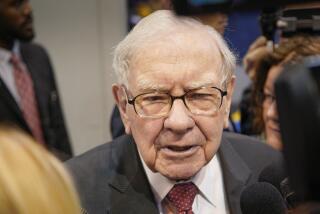About earlier stories in this series
- Share via
This series is based on more than 90 interviews and hundreds of documents, including thousands of pages of Gates Foundation grant descriptions and policies, evaluation reports, tax forms, filings to the U.S. Securities and Exchange Commission through September 2006, and lists of endowment holdings from 2002 through 2005.
Information was used from four leading services that provide guidance for investors regarding corporate performance: Calvert Group Ltd., Innovest Strategic Value Advisors, KLD Research & Analytics Inc. and Oekom Research. None of the companies was directly involved in The Times’ assessment of the Gates Foundation portfolio; they have taken no position on The Times’ conclusions.
The research groups consider companies in context and weigh their efforts to improve. For example, oil and gas companies are big polluters by nature, but some vigorously pursue pollution reduction or alternative-energy development. The researchers give more-favorable ratings to companies that make strong efforts to improve than to those that don’t.
The Times’ tally of Gates investments in companies that contradict its goals included only those firms that were ranked among the worst by the investment rating services, which considered their performance in one or more broad categories, including governance, environmental practices and social practices, or on one or more specific issues, such as product safety or human rights. The four services evaluate unique but overlapping sets of companies:
Calvert: The 1,000 largest U.S. companies measured by market capitalization.
Innovest: 1,255 U.S. and foreign companies.
KLD: The Russell 3,000 companies, plus many other U.S. and foreign companies.
Oekom: 108 U.S. and foreign companies in the oil and gas, banking and pharmaceutical industries.
Calvert rates companies based on several governance, social and environmental measures. Companies rejected for the Calvert social investment index, because of poor performance in one or more categories, were included in The Times’ total of Gates Foundation investments in firms that counter its charitable goals or socially concerned philosophy.
Innovest rates companies on seven levels for two overall categories: environmental and social. The Times’ total of Gates Foundation investments in firms that counter its goals or socially concerned philosophy included companies that received the lowest possible rating in either of those overall categories.
KLD provides relative scores in several governance, social and environmental categories. The Times included in its total of Gates Foundation investments that counter its goals or philosophy any holdings in companies that scored at least one standard deviation below the norm for all firms in each category. Depending on the category, this represented 1% to 15% of evaluated companies.
Oekom uses a minimum passing score within an industry group for overall corporate responsibility. Companies that failed to achieve a passing score were included in The Times’ total of Gates Foundation investments that conflict with its goals or philosophy.
The Times also included companies screened by Calvert, KLD or Innovest for significant problems involving diversity, human rights, product safety or other product-related concerns, and tobacco-product manufacturing and sales.
The four rating companies look at similar factors, and often reach the same conclusions. However, each service uses unique weightings and analysis, naturally resulting in some conflicting conclusions.
These evaluations were supplemented with Times reporting.
Companies among the 100 highest-polluting in the United States were derived from rankings by the University of Massachusetts Political Economy Research Institute. These rankings consider total air pollution released, toxicity of pollutants and the number of people at risk of exposure. The top 50 polluters in Canada were rated by the trade publication Corporate Knights, based largely on the University of Massachusetts approach.
The Times used several studies that reviewed or evaluated actions of the pharmaceutical industry regarding intellectual property rights, patents and drug pricing in developing nations. A preliminary list of relevant companies was drawn up using studies or evaluations conducted by Innovest, KLD, Oekom, the nonprofit medical group Doctors Without Borders and the Interfaith Center on Corporate Responsibility, a coalition of 275 faith-based institutional investors that includes religious groups, pension funds, endowments, hospital corporations and colleges.
The list was refined and validated in interviews with experts and through a review of more than 40 technical papers and analyses, including studies by the World Bank and the World Health Organization. Those sources were supplemented with reports and announcements from the pharmaceutical companies and the Pharmaceutical Research and Manufacturers of America, a leading trade group.
Companies in the sub-prime industry were compiled from National Mortgage News and Inside Mortgage Finance, leading trade publications. Times reporting validated and refined the list.
Information about proxies was gathered from the EthVest database, sponsored by the Interfaith Center on Corporate Responsibility. The data were supplemented by interviews with officials from various foundations.
The overall figures in this series may significantly understate the volume of Gates Foundation investments that tend to conflict with its charitable goals. There are several reasons:
1. The Gates Foundation did not provide details for approximately $4.3 billion worth of investments it characterizes as loans.
2. Among thousands of entries on the foundation’s investment lists, spelling errors or other irregularities in original source materials occasionally made definitive identification impossible; such erroneous listings were excluded from The Times’ total.
3. Subsidiaries were considered part of the parent companies if the parent owned more than 50% of the subsidiary. Though attempts were made to discover all such corporate linkages, those efforts were not exhaustive.
4. Many companies in the Gates portfolio were not evaluated for social or environmental impacts in materials provided by the ratings services used by The Times.
More to Read
Sign up for Essential California
The most important California stories and recommendations in your inbox every morning.
You may occasionally receive promotional content from the Los Angeles Times.










